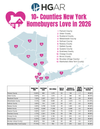ALBANY—New York Gov. Kathy Hochul announced on Sept. 10 the latest round of communities to achieve certification as part of New York State’s Climate Smart Communities Certification program, which supports local efforts to meet the economic, social, and environmental challenges posed by climate change. As part of the latest certification round, 31 local governments are being recognized for taking action to mitigate and adapt to climate change as New York State celebrates the 10-year anniversary of the Climate Smart Communities Certification program.
“Over the past decade, more than 425 local communities joined state efforts to tackle the climate crisis head on through the Climate Smart Communities program, benefitting local residents and creating green jobs,” Gov. Hochul said. “I congratulate this team on 10 years of implementing policies and plans that are successfully reducing greenhouse gas emissions to help build a stronger, more resilient Empire State.”
To achieve Climate Smart Community certification, local governments accumulate points for planning and implementing actions that reduce greenhouse gas emissions and improve community resilience in the face of worsening impacts of climate change. As part of this announcement, 26 communities successfully met the criteria to be newly recognized or re-certified by the State Department of Environmental Conservation as leaders at the bronze level. Five municipalities were certified at the silver level, the highest level of achievement under the program.
New York State Department of Environmental Conservation Interim Commissioner Sean Mahar said, “Municipalities across the state are helping DEC celebrate the 10th anniversary of New York’s Climate Smart Communities certification program, partnering with us to reduce greenhouse gas emissions and take local climate action. By achieving certification as a Climate Smart Community, municipalities are promoting sustainability, increasing zero-emission transportation, and reducing harmful pollution. We thank our local governments in supporting Governor Hochul’s ongoing efforts to reduce emissions and advance a clean energy transition that benefits all New Yorkers.”
Five municipalities were certified at the silver level, the highest level of achievement under the program. Dutchess County, the Village of Irvington, and the City of White Plains achieved silver certification during this round of the program. In 2019, Dutchess County received a nearly $100,000 Climate Smart Communities grant to offer a Climate Action Planning Institute for its municipalities. In 2022, Irvington was awarded a $1.13 million Climate Smart Communities grant to mitigate flooding along Route 9, and in 2017, received nearly $300,000 to right-size a culvert to reduce flooding in the Hudson View Park neighborhood, in addition to $5,000 in Municipal Zero-Emission Vehicle rebate funding for one battery electric vehicle in 2016. White Plains received two Zero-Emission Vehicle Infrastructure grants in 2022 totaling $20,379 for four Level 2 charging ports. The Town of New Castle and the Village of Croton-on-Hudson were recertified as silver this round.
New and certified bronze certified Climate Smart Communities from the Mid-Hudson region were:
Town of Amenia (newly certified)
Town of Bethel (re-certified)
Town of Clinton (newly certified)
Town of Highlands (newly certified)
Orange County (re-certified)
Village of Pleasantville (re-certified)
Village of Upper Nyack (newly certified)
Village of Warwick (re-certified)
Village of Woodbury (newly certified)
To receive Climate Smart Community certification, local governments accumulate points for planning and implementing actions that reduce greenhouse gas emissions and improve community resilience in the face of worsening impacts of climate change. To date, 426 local governments, representing more than 9.5 million New Yorkers, have adopted the Climate Smart Communities pledge.
This year, the Climate Smart Communities certification program celebrates its 10th anniversary, and DEC held an anniversary celebration at the New York State Association of Counties’ Fall Seminar on Monday, Sept. 9. Launched in 2014, the certification program provides a robust climate planning framework and recognizes the leadership and accomplishments of communities taking climate action. Each certification is valid for five years. There are now 163 total certified Climate Smart Communities in New York State, 17 silver and 146 bronze. To be certified, communities must demonstrate an active climate change task force that includes residents and municipal representatives. Most certified communities completed greenhouse gas inventories that calculate emissions at the local level and help local leaders identify how best to help New York State meet its ambitious greenhouse gas emission reduction directives under the Climate Act.
DEC’s Climate Smart Communities grant program made $22.5 million available to help municipalities take action to address climate change. Funding for the program is supported by the State's Environmental Protection Fund and the Environmental Bond Act. Eligible projects include reducing flood risk, relocating or retrofitting critical infrastructure, reducing emissions from food waste, and climate change planning and assessment as part of the Climate Smart Communities Certification program. Since the program's inception, DEC has awarded more than $70 million to municipalities in support of local climate mitigation and adaptation projects.
If awarded a grant, municipalities must provide at least 50% of the total costs for most projects. However, this year’s State budget promotes equity by authorizing DEC to provide up to 80% of the cost of municipal projects that meet the criteria for financial hardship and for projects located in disadvantaged communities. More information about the grant program is available on the DEC website.








